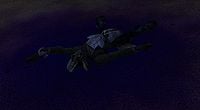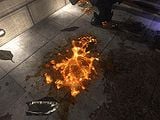Blood: Difference between revisions
From Halopedia, the Halo wiki
| Line 62: | Line 62: | ||
File:SkirmisherBleeding.jpg|A Skirmisher's blood after being shot. | File:SkirmisherBleeding.jpg|A Skirmisher's blood after being shot. | ||
File:HTRmc-Conviction-Corpse.jpg|A San'Shyuum's blood. | File:HTRmc-Conviction-Corpse.jpg|A San'Shyuum's blood. | ||
File:lastson.png|The blood of [[Resa 'Azavayl]] after being killed. | |||
</gallery> | </gallery> | ||
Revision as of 23:38, October 25, 2016
| There is more information available on this subject at Blood on the English Wikipedia. |
- "Oh. My. God. You're covered in..."
- — Janissary James
Blood is used to transport nutrients through the body of a multicellular organism. In the case of humans, it uses a compound called hemoglobin to transport oxygen to the cells. Because of cellular respiration, every single cell in the human body needs oxygen, so blood must deliver oxygen to every cell in the body. This is most likely true all of the other Covenant races, though their blood may be delivering a different compound to the body, resulting in its difference in color to human blood.
Overview
Humans will bleed red blood when shot. Forerunner artifacts, such as the Menachite Forerunner complex, may at times be manipulated by human blood.[1] The Flood will always bleed a pasty, brownish-green color, and the explosion of a carrier form or an infection form will leave a brown stain on the ground. In gameplay, however, infection forms do not "bleed", but rather explode into bits of flesh.
When shot without the protection of an energy shield, the target will "bleed." In some races, the blood will visibly come out of the target, and leave a stain on the ground. The viscosity and color of the blood varies by race.
Blood and bleeding hold a special significance in Sangheili culture. Having one's blood spilled outside the battlefield is considered dishonorable; for this reason, doctors are not held in a high regard.[2] Blood is also a repeated motif in Sangheili maxims or proverbs.[3][4] Due to its cultural significance, "blood" is also a Sangheili curse word.[5]
Blood colors
- Human - Red
- Sangheili - Dark blue/purple (Halo: Combat Evolved)[6], purple (Halo 2 and Halo 3)
- Jiralhanae - Dark navy blue/black (Halo 2), purplish red, thick (Halo 3), red (Halo: Reach)
- Mgalekgolo - Bright orange
- San'Shyuum - Red
- Kig-Yar/T'vaoan - Dark blue/purple (Halo: Combat Evolved), purple (Halo 2 and Halo 3)
- Unggoy - Light blue, teal, very thick[7]
- Yanme'e - White, with slight green tint
- Huragok - Reddish pink,[8] blue purple[9]
- Flood - Brownish-green
- Forerunner - Purple[10]
Blood type
- "Hang two units, O-neg, and he needs an airway."
- — A UNSC Marine Corps medic during the Battle of Mombasa.
A blood type is a classification of blood based on the presence or absence of inherited antigenic substances on the surface of red blood cells. The blood type is often included on identification patches or on tattoos worn by military personnel, in case they should need an emergency blood transfusion; certain variants of MJOLNIR and ODST armors, for example, are equipped with MEDREF labels displaying the blood type of the wearer. Individuals with known blood types include:
- Jorge-052: B+
- Edward Buck: O-
- Samantha Wisner: O-
- Taylor Miles: B+
- T. Rymann O+
- Kojo Agu: AB-
- The Rookie: O+
- Talitha Macer: AB+
- Randall Aiken: AB-
Trivia
- Sometimes in Halo: Combat Evolved bullet holes with blood and/or blood splatters will be visible at certain angles though nothing was there or nothing was shot or hurt.
- In Halo: Combat Evolved, when the player repeatedly melee Covenant species (most effectively on Jackals), an unlimited amount of blood will come out.
- Sometimes in Halo: Combat Evolved on the Xbox, the game will lag if too many blood decals are being rendered.
- In Halo: The Flood, the word ichor was in some cases used as a synonym of the word blood.[11] The word "ichor" originates from Greek mythology, where ichor was the golden blood of the Greek Gods of Olympus.
- The blood and the amount of blood of Covenant foes changes during the course of the three Halo games. For example, Grunts, Elites, Hunters and Jackals bled profoundly when meleed in Halo: Combat Evolved, and yet, in Halo 2, the player must shoot the corpse in order for it to bleed. In Halo 3, the amount of blood is lessened dramatically, but is given in greater detail. Grunt blood also seems more viscous, as opposed to slightly watery looking in the earlier games.
- In Halo 3, when a Brute is shot and blood is spilled, there seems to be odd luminous chunks in the blood. This can also be seen in human blood as well.
- The Brutes are the only race to have significantly different colored blood from one game to another, although in some Halo Legends episodes, other species also have different blood color than the games.
- As a unique feature among Forerunner machines (such as sentinels or monitors), the Promethean constructs "bleed" an orange fluid when damaged or destroyed.
Gallery
- 1215574434 Brute3.jpg
A Brute's blood after being killed by a grenade.
A Jackal's blood stain in Halo: Combat Evolved.
- 1215645880 Jackal Blood.jpg
A Jackal's blood stain in Halo 3.
- 1215578204 Hunter.jpg
A Hunter's blood after it was killed by an explosive.
- 1215495677 43652110-Full.jpg
A Drone's blood stain.
- Bloody.jpg
When concentrated, an Elite's blood is actually a dark blue.
The blood of Resa 'Azavayl after being killed.
Sources
- ^ Halo: First Strike, page 141 ("Fred felt a hot pain in the tip of his finger. He drew his bare hand away and a tiny track of blood smeared the rock. The glittering symbols on the wall took on a greasy cast")
- ^ Halo: The Cole Protocol, page 143
- ^ Halo 2, campaign level The Arbiter ("On the blood of our fathers, on the blood of our sons... We swore to uphold the Covenant!")
- ^ Halo: Ghosts of Onyx, page 278 ("Our blood will forge a thousand generations.")
- ^ Halo: The Cole Protocol, page 140
- ^ Sangheili corpse that was meleed multiple times
- ^ A Grunt getting shot
- ^ Halo Graphic Novel, page 18
- ^ Halo 3: ODST
- ^ Halo: Silentium, page 145
- ^ Halo: The Flood, page 27







